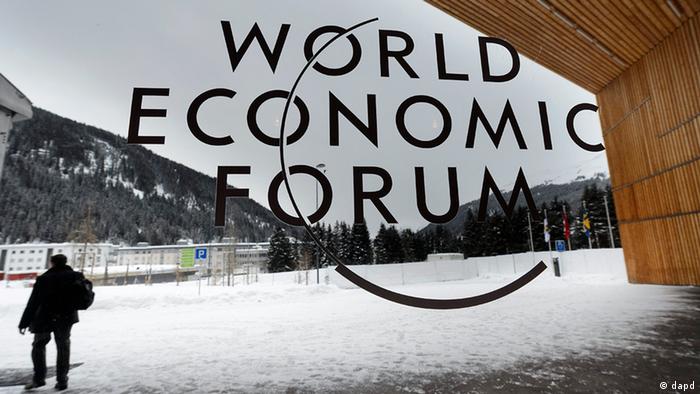Social entrepreneurs are no longer fighting lonely battles - they have set up an international network. And the Davos forum gives them a perfect platform to bang their drum.
Manila, Taipei, Amsterdam, Zurich, Davos - Mark Ruiz has been traveling for 26 hours. Now the entrepreneur from the Philippines has arrived in Davos in the Swiss Alps, looking at snow covered mountains, and he says it was worth the trip.
He will be spending a few days at the World Economic Forum, where he wants to be rubbing shoulders with the world's most powerful people, among them German Chancellor Angela Merkel, IMF boss Christine Lagarde and several hundred CEOs of big international companies.
Fighting for change
Ruiz is himself an entrepreneur, but his mission is to bring about a change in society and his goal is to abolish poverty in his home country. He founded "Hapinoy" in 2007 - a network of small shops known locally as "sari-sari stores." Ruiz hopes to find alternative channels for trade in objects produced locally by poor families in their homes.
"More that 20 million Filipinos live below the poverty line," he explains. "They do not have access to official marketing channels, because most of them have no official permission for trade or production."
 Victims of catastrophic weather in the Philippines have turned to begging
Victims of catastrophic weather in the Philippines have turned to begging
Ruiz wants to change that. Some 10,000 of these mini-shops are already grouped in his network. He proudly points out that he has already managed to set up a partnership between the country's largest food producer, an NGO and some small farmers. This has paved the way for those farmers to get access to the official distribution channels.
"We have the choice," Ruiz said. "If we want to change things we have to get moving. We entrepreneurs in the social sector work like any other entrepreneurs. But our aim is not personal profit, but rather to make a difference to our society." He hopes to meet the head of global food giant Nestle in Davos and convince him to support his cause.
Social entrepreneurs have a history at Davos
Hilde Schwab heads the "Schwab Foundation," which she founded together with her husband Klaus. She has been lobbying on behalf of social entrepreneurs at Davos for several years now and managed to secure invitations for many of them. She invites them not only to the forum in Davos, but also to regional meetings of the World Economic Forum (WEF), which take place in Asia and Latin America. She says the social entrepreneurs first and foremost need to spread their message in developing countries.
Mark Ruiz is one of 30 social entrepreneurs she has invited to Davos this year. She has given them an opportunity to present their projects in person, to discuss different models of combating poverty and to bring their new and fresh ideas into the mainstream discussions, and - above all - to expand their networks.
 Entrepreneurs like Tri Mumpini want to use alternative energy to bring power to the poorest regions
Entrepreneurs like Tri Mumpini want to use alternative energy to bring power to the poorest regions
Energy for the poorest
Tri Mumpini, a social entrepreneur from Indonesia, is shivering as she wades through ankle-deep snow to her next meeting at a venue by Lake Davos. She is wrapped in several colorful layers of Indonesian shawls, which definitely makes her stand out. She represents an organization called IBEKA, which she founded back in 1992. Her mission is access to energy at a reasonable price.
Around 40 percent of Indonesia's population has very limited access to electricity. This impedes their economic development and makes it impossible to leave poverty behind, she explained, saying she believes Davos is the most natural place for her to be.
"This is where the entrepreneurs and managers meet who want to shape the future of their companies. Sustainability is a key factor in their plans. Pure profit orientation is not the way to go," she insists.
IBEKA has set up 61 small hydraulic power plants, most of which provide 10,000 Indonesian households with affordable electricity; four of them feed into the main power network. The families that benefit from IBEKA's initiative are those who used to burn kerosene in their lamps - and had to pay six US dollars per month for this. Now, thanks to the hydraulic plants they pay less than one dollar per month for a reliable stream of electricity.
 By making an irrigation pump affordable, Debbie Taylor helped farmers in Myanmar double their income
By making an irrigation pump affordable, Debbie Taylor helped farmers in Myanmar double their income
Modern technology for simple products
Debbie Taylor has come to Davos from one of the poorest countries in the world: Myanmar. Together with her husband Jim Taylor, an American citizen, she founded "Proximity Designs" eight years ago.
In her own design studio in Myanmar she develops simple products that even the poorest people can afford. This includes, for example, an irrigation system that allows farmers to pump water to their fields with a simple foot-operated pump. This has already helped farmers to double their income, which again allowed them to buy more food and to send their children to school.
It is a challenge for the young designers to develop products like water tanks or solar lamps that even Myanmar's farmers can afford. The Taylors also have international partnerships, for example with the Institute of Design at Stanford University in the US.
Now they want to take the opportunity to draw attention to their country and Debbie says this is a good time to do so.
"Our country is in the international spotlight right now. We are undergoing a radical transformation, which can only be successful if everyone in our society can benefit." dw de

No comments:
Post a Comment